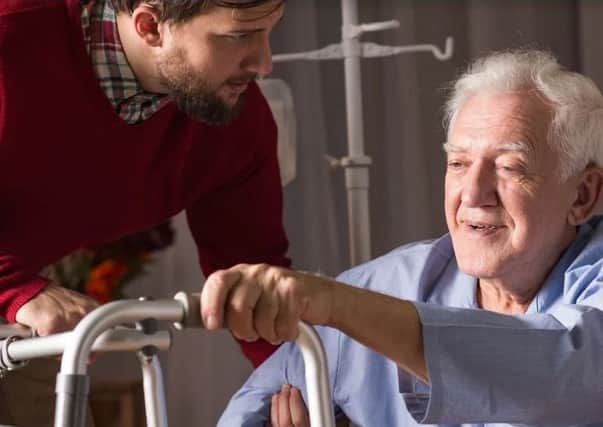The Great NHS Gamble: '˜NHS plan focuses on strokes when they happen not aftercare'


Advertisement
Hide AdAdvertisement
Hide AdMany of the plans to shake up services in the NHS and change the way of working talk about having specialised services – but campaigners fear this may mean patients travelling further to fewer hospitals.
A large number of the 44 Sustainability and Transformation Plans talk about having more specialist services to treat things such as stroke - something that hasn’t escaped the attention of The Stroke Association.
Advertisement
Hide AdAdvertisement
Hide AdEsmee Russell, head of policy and influencing at The Stroke Association, said: “We have picked up on the fact that a lot of the STPs are using these plans to push forward on reorganisation of acute stroke care.
“Reorganisation of acute stroke care has been happening for a while.
“It has happened successfully in London and Manchester and other areas are now looking to do it.
“A ‘hyper stroke unit’ is when stroke care is reorganised into one huge centre where there is all the equipment and expertise to treat stroke and it is staffed 24/7.
Advertisement
Hide AdAdvertisement
Hide Ad“The evidence from London and Manchester shows that when people are treated at these hyper stroke units, they spend less time in hospital and are less likely to die as a result of the stroke.
“This improves lives but it also saves the NHS money at the same time.”
Ms Russell says, although the Stroke Association is backing health leaders across the country to continue with the reorganisation of stroke care, they want to make sure it is done properly.
She explains: “We would like everyone to be a maximum of 45 minutes away from one of these hyper stroke units.
Advertisement
Hide AdAdvertisement
Hide Ad“We also want to ensure the units are well staffed by having enough consultants with stroke expertise and that they meet the standards around scanning which is that every patient should be scanned within one hour of arrival at the unit.
“They also need to be able to provide treatments for stroke such as thrombolysis – which is a drug injected into individuals which breaks up the clot.
“The aim is to have 90 per cent of appropriate patients thrombolysed within 45 minutes of arrival to the unit as the treatment has to be given within four hours of the onset of symptoms of a stroke.”
Although many people fear travelling further for treatment will have a negative impact on recovery, Ms Russell says people are much likely to recover from stroke if they receive the specialist care they need.”
Advertisement
Hide AdAdvertisement
Hide AdShe says: “Evidence shows people are more likely to receive this in hyper stroke units even if it means travelling a bit further.
“If the hyper stroke units are run as they should be, they will be more efficient when it comes to scanning patients and giving the treatment patients need in time.”
The concerns The Stroke Association has around the STP plans are around post acute stroke care and making sure patients get the support they need after a stroke.
Ms Russell says: “A lot of the plans don’t give details of the support patients will get when they leave hospital. This can be things like language therapy, physiotherapy and emotional therapy.
Advertisement
Hide AdAdvertisement
Hide Ad“This is a big area of concern for stroke survivors. Forty five per cent of stroke survivors have revealed they felt abandoned after leaving hospital.
“We have a real concern that the STP Plans are not addressing this. They are looking at treating stroke when it happens, but not the aftercare.
“It is very important to make sure stroke survivors have the right care afterwards to aid their recovery.
“It is about making sure individual stroke survivors get the support they need. Some patients can self manage but others need the support of professionals and it is important they get this.
Advertisement
Hide AdAdvertisement
Hide Ad“As long as they are set up correctly, we are in favour of hyper stroke units. There is work going on to look at local geography to see where these hyper stroke units should be located.”
SPECIALISED CARE - DR Amanda Doyle, Lead for Lancashire and South Cumbria
Something that is a big issue when it comes to health is that for some serious conditions, people don’t always get the best clinical outcome from their treatment as they could do if we delivered care differently.
“When it comes to things like stroke, the outcome for people in Lancashire and South Cumbria is not as good as if we did things differently.
Advertisement
Hide AdAdvertisement
Hide Ad“There is a lot of evidence that very specialist centres for some conditions produce better outcomes.
“A good example of this is the Cardiac Centre at Blackpool.
“People from all over the patch will go directly to Blackpool where there is a very specialist service.
“You are much safer travelling further to a specialist centre which is able to give the specialist treatment you need than you are going to a very close hospital that is not able to do that.
“Time is of the essence but it is not the major factor.
“You are better travelling further than going somewhere close by that does not have the treatment you need.
Advertisement
Hide AdAdvertisement
Hide Ad“We have done this for several years now with heart attacks and the survival outcomes have improved significantly.
“In the STP, we are carrying out a review of hospital services and specialist services to look at the best way of delivering them.
“For some very specialist conditions like stroke, it is likely to mean changes in where we provide this.”